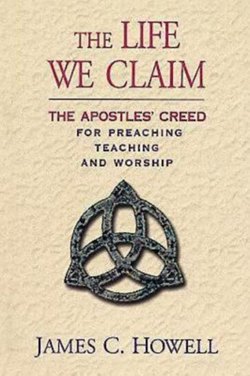Читать книгу The Life We Claim - James C. Howell - Страница 7
На сайте Литреса книга снята с продажи.
C h a p t e r O n e INTRODUCTION TO THE APOSTLES' CREED
Оглавление_____________________________________________
LESSON 1
GROWING INTO OUR CONVICTIONS
Be ready to give an account for the hope that is in you, and
do it with gentleness and reverence. (1 Peter 3:15, AP)
In ancient times, hundreds of Christians, under interrogation, refused to bow down to the empire's gods, stood their ground and declared, "I believe in God the Father almighty, maker of heaven and earth," and were executed for saying so. They had not long before left their old life behind and risked everything by choosing Christianity. In those days, new converts were instructed in the faith for months, during which time they fasted, abstained from entertainment and sex, and were prayed over diligently by the church elders. An all-night prayer vigil culminated at dawn on Easter when the converts waded out into a pool of water and were asked: "Do you believe in God the Father almighty, maker of heaven and earth? Do you believe in Jesus Christ his only Son, our Lord?" After being baptized, they were anointed with oil, dressed in a white robe, and given a drink of milk and honey, powerful symbols of their new life in Christ.
Every time we say the Apostles' Creed, we step into a long, steady river, the great two-thousand year story of believers, missionaries, and martyrs. When I say "I believe in God," I become part of something bigger than myself. My faith is something in me, my reaching out, my believing; but faith is also outside myself. Faith has content. I attach myself to something old. Modern culture fawns after novelties, the latest fads. Christians look at the world with old eyes; as John Henry Newman put it, "Great acts take time." Ultimate truth cannot have been cooked up just last night, and ultimate truth does not materialize in my mind in a flash. "Deep convictions are not hazarded, but grown into slowly, obscurely and often painfully acquired" (Nicholas Lash).1
The Apostles' Creed helps us grow into our convictions. To believe without the Creed would be like baking without a measuring cup or building furniture without a ruler. We read the Bible, we sing hymns, we ask questions and reflect together on theology, and it is easy to miss the forest for the trees. What is at the heart of what we believe? We will use the Apostles' Creed to discover what we believe, and don't believe, to figure out who we are and how to live.
The word credo means "I believe." Do we live in a disbelieving age? or in an overly credulous age? We are titans of doubt and cynicism, and yet advertisers and TV shows make our heads spin over nothing at all. Faith is not believing impossible things. Faith is what I give my heart to. Faith is how I view the universe; just as Copernicus yanked our perspective so we see the world isn't flat, and the earth isn't in the center of things, so the Creed suggests there is a deeper dimension than the stage we normally stroll upon, and we aren't in the middle of things. God is.
"I believe" is not the same as saying "I feel" or "I want" or "I think," but rather, "God is"—and I fling myself upon God, I attach myself to God. Nicholas Lash wrote that, theologically, "I believe" is grammatically equivalent to "I promise": "'I believe' does not express an opinion, however well founded or firmly held, concerning God's existence. It promises that life and love, mind, heart, and all my actions, are set henceforward steadfastly on God, and God alone."2
The Creed is not a list of facts so much as it is an act of worship, an act of prayer. The Creed's logic teaches us how our religious ideas hang together. "Words take meaning from the company they keep" (Lash).3 And the words take on their only valid meaning when our lives are changed. Our faith is something we do; our faith comes to life when we engage in those peculiar practices Christians count on to keep their minds and bodies in sync. It would be worse than futile to expend mental energy on the Creed while shielding our practical lives from transformation, which is our true worship.4
